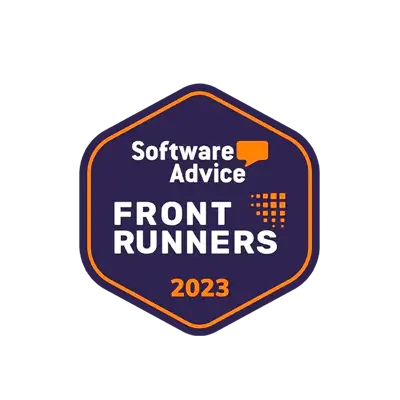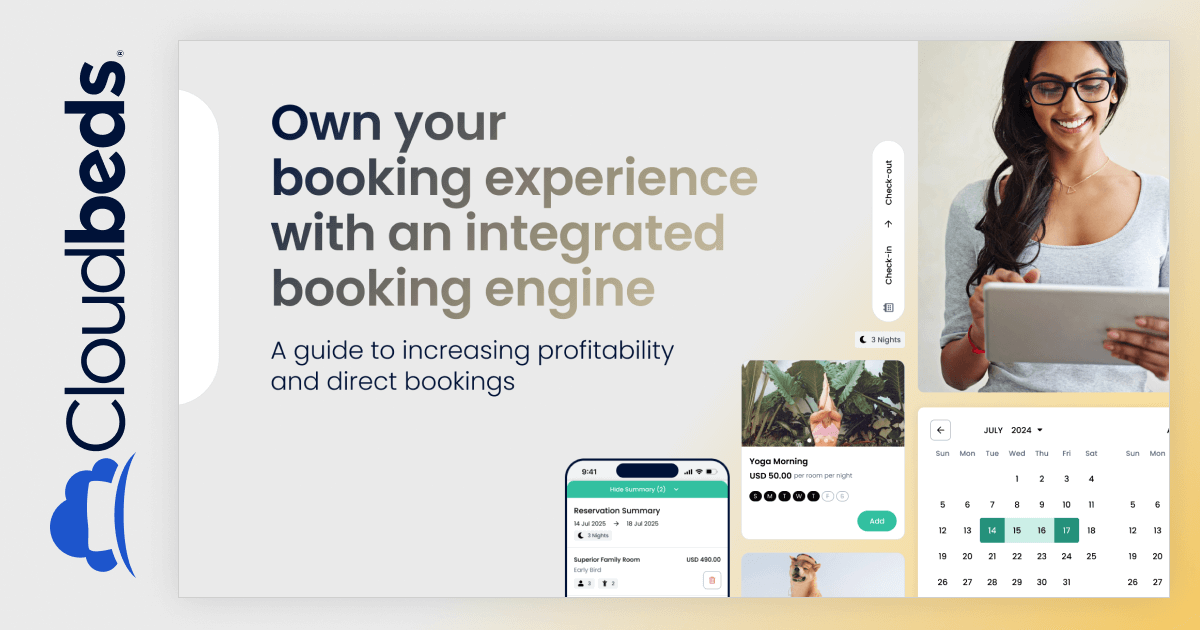
By Lana Cook
Are you wondering whether you need a hotel booking engine? Many hoteliers question if it’s worthwhile investing in a direct booking strategy or if they can solely rely on online travel agencies (OTAs) like Airbnb, Booking.com, or Trip.com to fill occupancy.
What many lodging businesses overlook are the different ways direct bookings can be captured. Using an online booking engine, hotels can drive direct reservations via their website, metasearch engines like Trivago and Google, social media platforms, email, messaging apps, and more.
Mastering the art of direct bookings is pivotal for a property’s success. It’s not just about filling rooms but creating and owning an experience that speaks to each guest. At the heart of this strategy lies booking engine software that can elevate the guest experience, optimizing it for convenience and profitability.
In this guide, we’ll examine how an integrated booking engine brings value to lodging operators, using real-world examples from our customers and advice on what to look for in a new booking system.
What is a booking engine?
A booking engine is a platform used by lodging businesses to capture direct bookings anywhere a guest might be online. Think of your booking engine as a bridge between potential guests and your property, facilitating a seamless booking experience without the need for third-party intervention via online travel agencies (OTAs), GDSs, travel agents, or online marketplaces.
A booking engine offers real-time availability, secure payment processing, and instant confirmations. It can be customized to fit your brand, cater to international audiences with multi-language and currency options, and offer add-ons or upsells to help you increase revenue.
Today, lodging operators can choose an integrated booking engine that seamlessly collects and sends reservation details and payment information to their property management system (PMS), channel manager, payment gateway, and more.
In the following sections, we’ll look at how a booking engine can help you customize the traveler journey, secure more commission-free bookings, increase revenue, and gain valuable insights into guest behavior.
Customize the traveler’s journey
Consumer preferences have shifted significantly with the introduction of highly personalized technology like Netflix, Amazon, and Uber. To keep up with travelers’ desire for convenience and personalization, lodging operators must leverage their booking engine’s features.
Your booking engine can help to customize the guest journey through the following methods.
- Upsells and add-ons. Travelers crave experiences. Your booking engine can introduce guests to a range of activities and experiences both in-house and with your partners that can enhance their stay and increase your overall revenue. Think room upgrades, bike rentals, city tours, or wine tastings – all available during the reservation process.
- Multiple rate plans. On your booking engine, showcase your different rate plans like breakfast included, early-bird, or extended-stay discounts so that travelers can choose the plan that best fits their needs.
- Transparency. Travelers should have full transparency when looking at your booking engine’s calendar to see restrictions like length of stay, closed-to-arrival, and closed-to-departure so they can easily choose dates without running into errors.
- Branding. First impressions matter. When a potential guest moves through your hotel website and lands on your booking engine, it should provide a consistent look and feel. A customizable booking engine will allow you to tailor design elements to ensure your brand’s colors, fonts, and overall aesthetics are met to reinforce trust and confidence with website visitors.
- Language and currency. The world is more connected than ever. To cater to this global audience, booking engines must offer multi-language support and currency conversion to streamline the booking process for international guests.
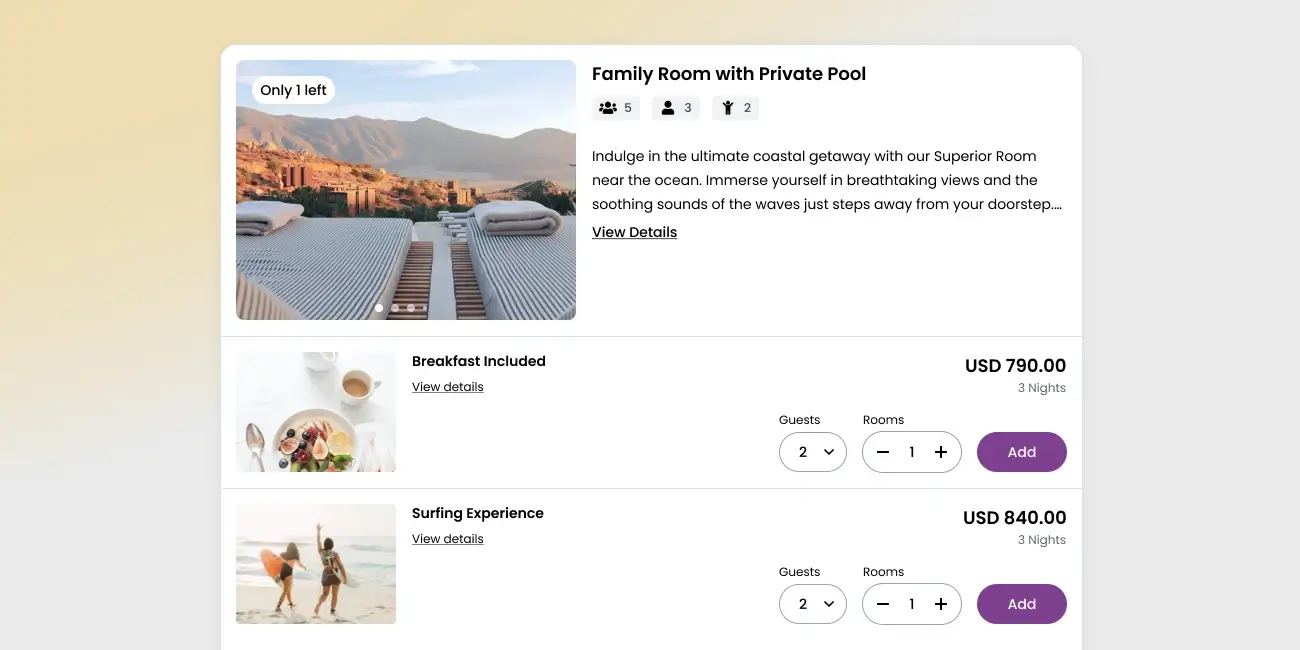
The ZERO Hotels customizes its booking engine to instill trust in travelers
The ZERO Hotels are a unique collection of properties across Portugal that offer guests an unparalleled lodging experience. Their ZERO Box Lodge is the most popular offering, inspired by Japanese capsule hotels where guests stay in minimalistic wooden boxes equipped with a private bathroom in a shared dorm.
Bernardo Thierstein, General Manager at The ZERO Box Lodge Porto, knew they needed a hospitality platform and booking engine that was easy to use and provided the freedom to experiment with rate plans and promotions to drive more direct bookings.
The ZERO Hotels adopted the Cloudbeds Platform and seamlessly integrated the Cloudbeds Booking Engine to match the design of their existing website and collect payments securely. They’ve seen a huge increase in direct bookings thanks to their connection to Google Hotel Search, and Bernardo plans to experiment with the Booking Engine’s design and promotional offerings to drive even more.
Secure direct bookings
Travelers have a ton of options when it comes to making online reservations. To steer them towards your direct channels, it’s important to provide a secure and seamless guest experience.
Here’s how your booking engine can help drive more direct bookings.
- Secure payment processing. Financial security tops the list of concerns for most travelers booking online. Using a booking engine with a secure, encrypted, and integrated payment processor (made clear on your site) can reassure travelers and boost the likelihood of a completed booking.
- Automated emails and messages. Instant gratification is the hallmark of the digital age. Once a booking is made, guests expect prompt confirmation via email and other messaging platforms (ie. SMS, WhatsApp, Messenger).
- Mobile functionality. An Expedia study found that 32% of travelers booked their most recent trip on mobile. A mobile-responsive booking engine ensures a user-friendly experience for travelers to effortlessly make reservations on the go.
- Metasearch integrations. Travelers use booking sites like Trivago and Tripadvisor to compare hotels and book. Integrating with these engines and offering real-time pricing and availability ensures that guests book directly instead of with an OTA.
- Rate comparison widget. Price comparison is second nature today, so a rate comparison widget is vital to any booking engine. This widget displays how your rate compares to OTAs, nudging guests to book directly (assuming you’re offering the lowest price).
- Deals and promotions. To urge travelers to book direct, allow them to book special offer rates or use promotion codes only available via your booking engine. Consider offering weeknight rates, promo codes for special events, or loyalty discounts for repeat customers.
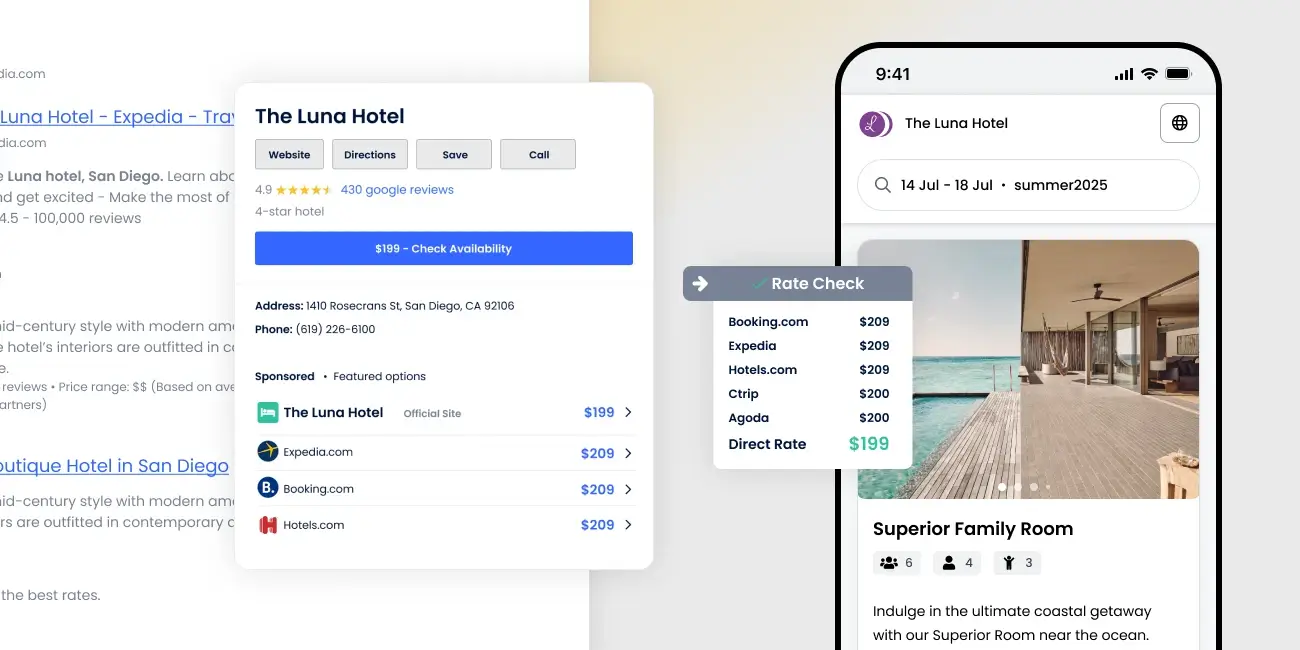
Himmapana Villas experiences massive growth in direct bookings
Located in the Kamala Beach area in Phuket, Thailand, are four dreamy luxury resorts that make up the Himmapana brand. Thomas K. Petersen, Managing Partner, went from managing three villas to building Himmapana, which consists of 41 high-end villas complete with luxury pools, massage services, private chef bookings, and much more.
The Himmapana Villas manage around 2,000 bookings annually and needed a reliable hospitality platform, especially a booking engine that could take bookings 24/7.
Since adopting the Cloudbeds Platform, Thomas and his team have seen massive growth in the volume of direct bookings over the past year. He attributes this success to a strong presence on social media channels in conjunction with the Cloudbeds Booking Engine and payment processor on their website.
Increase revenue and profitability
An integrated booking engine is a game-changer for increasing revenue and overall profitability. It can help you pocket more from guests with little to no output.
Here are a few ways a booking engine can help increase your revenue and profitability.
- Diverse distribution mix. Creating a more diverse distribution mix made up of both OTAs and direct sources is crucial for optimal profitability. If you rely too heavily on OTAs, you risk giving away your profit in commissions.
- Intelligent pricing. Booking engines integrated with a pricing intelligence engine or revenue management system can help you price more strategically using automation, adjusting rate plans and room types based on demand, seasonality, and other factors.
- Multi-property functionality. If you have multiple properties, your booking engine can serve as a unified portal for guests to search across your portfolio. This provides a better user experience and can strategically guide visitors towards higher-margin properties or dates with greater availability.
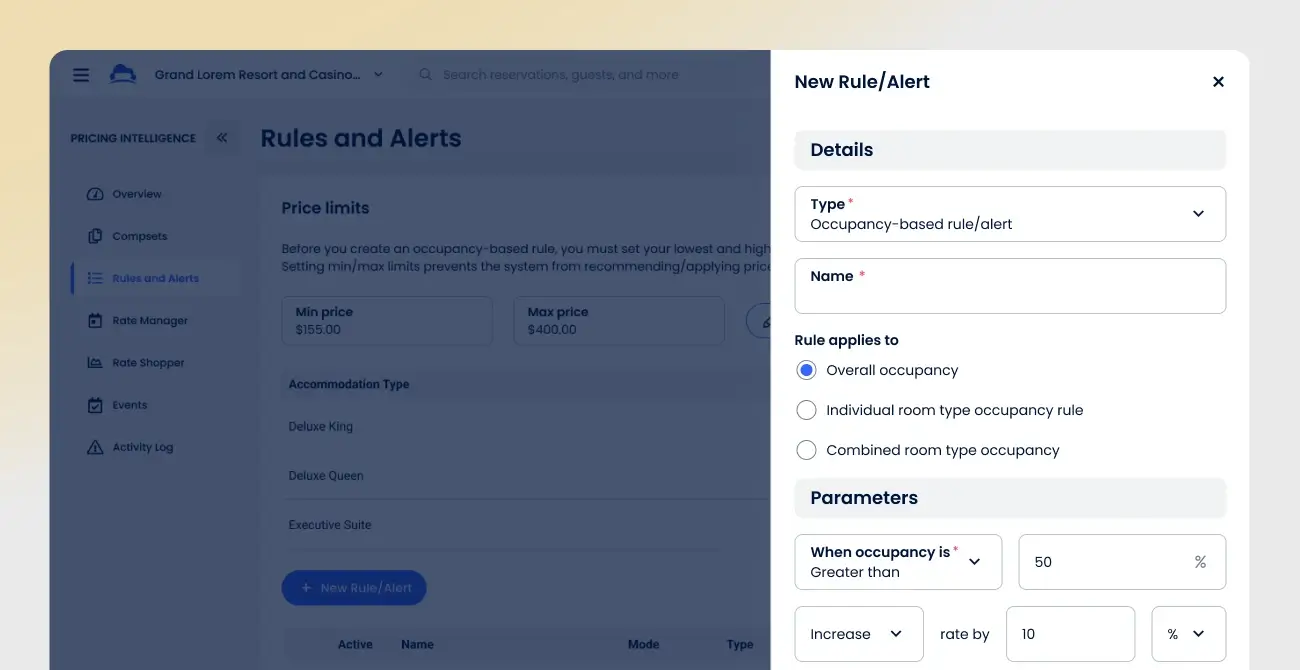
Get insights into guest behavior
Your website collects immense amounts of data, and your booking engine can help you understand it.
Here’s how your booking engine can help provide insight into your guests.
- Robust reporting. Integrated booking engines come equipped with in-depth reporting capabilities since data is centralized from your PMS and channel manager. These reports can shed light on booking trends, average length of stay, and guest preferences to help guide decision-making.
- Integration with Google Analytics. Use Google Analytics to track and generate reports on every shopper that passes through your booking engine to gain a granular understanding of guests’ online behaviors.
- Facebook Pixel tracking. If you’re running Facebook ads, you can keep track of conversions and optimize your audience and messaging to boost ad performance and drive more bookings.
What to consider when choosing a provider
Now that you know what to look for in a booking engine – it’s time to choose the right provider. Some must-haves include:
Pricing model. Does the provider work on a per-booking commission basis? Does a flat fee/subscription model apply? Are there mandatory setup fees?
Onboarding and ongoing support. Before deciding on a provider, you’ll want to know what it takes to get started. How long is the onboarding process? Is there guidance for setting up your account? What kind of support do they offer? How robust is the knowledge base for self-service learning and troubleshooting?
Safety and security compliance. When it comes to software that handles sensitive data, like your rates and guest payment information, you’ll want to ensure your data is secure. Inquire about compliance: PCI DSS, SCA, Guest data compliance, and GDPR.
Customer reviews. Check online reviews on reputable software review sites like Capterra, Software Advice, and Hotel Tech Report.
Earn more with an integrated booking engine
The Cloudbeds Platform offers an award-winning, fully integrated booking engine that helps hoteliers customize the traveler journey, secure direct bookings, increase revenue, and gain insights into guests.
With the Cloudbeds Booking Engine, your PMS and Channel Manager are automatically updated to prevent overbookings. You can also set up automated communications throughout the guest journey to engage with travelers after they’ve booked and maximize upsell opportunities.






